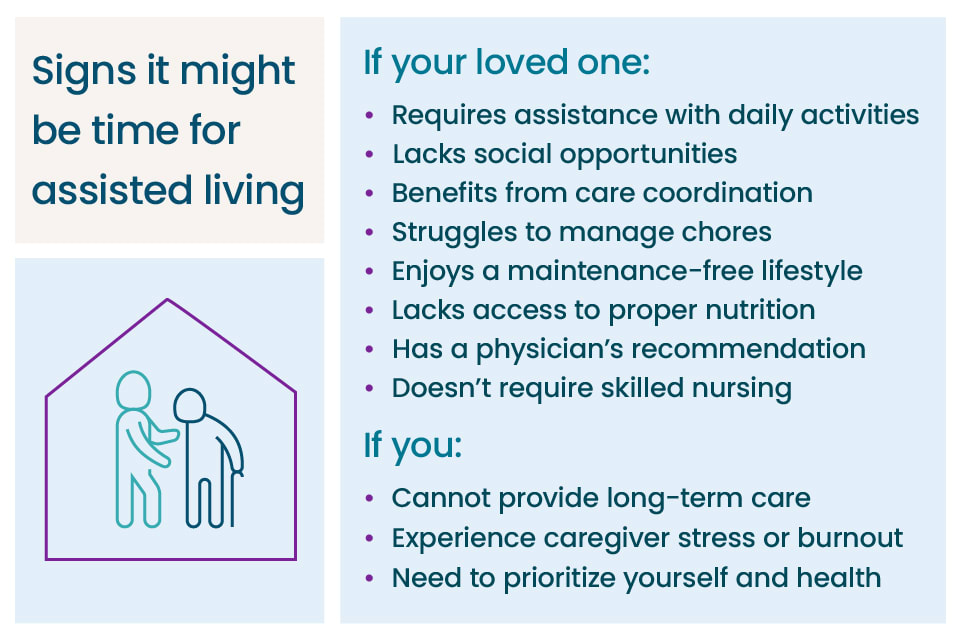
11 Signs It Might Be Time for Assisted Living

Assisted living communities can help support seniors physically and socially as they age. But like everyone, older adults want to preserve their independence. You’ll know it’s time for assisted living when a loved one can no longer live comfortably at home without assistance. Ideally, you’ll be able to make an unhurried decision, but sometimes a crisis demands action. Barbara Levison, a geriatric care manager and the president of Florida’s Aging Life Care Association chapter, has seen both scenarios and shares her tips here. Assisted living is all about balance — a little help and as much independence as possible. Is assisted living the right fit for your senior loved one? Answer these 11 questions to see.
Let our care assessment guide you
Our free tool provides options, advice, and next steps based on your unique situation.
Key Takeaways
- Assisted living communities can offer seniors the help they need while focusing on maintaining independence. A safe, supportive environment allows older adults to thrive.
- Seniors in assisted living often form connections with other residents. These friendships can help prevent senior isolation and increase a senior’s likelihood of participating in enriching activities.
- Assisted living communities can coordinate care for residents to reduce hospital visits and the risk of serious health complications. Doctors, physical therapists, and other health professionals may even provide services in the community.
- Caregivers are at serious risk for health complications of their own. Sixty-five percent of caregivers report sacrificing their own physical and mental health in order to care for a loved one.
Does your loved one require help with activities of daily living?
Activities of daily living (ADLs), such as dressing, bathing, and using the toilet, present frequent concerns for seniors. Approximately 14.2% of adults 75+ need personal care assistance as of 2022, according to data gathered by the Centers for Disease Control and Prevention (CDC).[01]
Medication management stands out as one of the most common concerns for seniors and caregivers. In a 2020 A Place for Mom survey of more than 1,000 caregivers, 60% were considering a move to assisted living for their senior loved one due to issues with medication management.[02] Errors in medication management can pose a real danger for seniors: The CDC estimates 350,000 people are hospitalized each year due to misuse of prescriptions.[03]
Beyond medication management, assisted living communities provide help with other daily tasks, such as bathing, which benefits both seniors and their caregivers. For Linda Lagesse, 78, who served as her husband’s sole caregiver for nearly four years, an inability to assist with ADLs motivated her to contact A Place for Mom’s Senior Living Advisors to find assisted living for her husband.
“I bathed him. I dressed him. I tried to help him get exercise,” Lagesse recalls. “I was exhausted. It just got to be a lot.”
Do they need more opportunities for socialization?
Alongside positive relationships with staff, seniors in assisted living often form connections with other residents. These friendships can help prevent senior isolation as well as increase a senior’s likelihood of participating in enriching activities.
If your loved one is living at home, they may sometimes seem bored or have little social interaction with other people their age. Assisted living remedies this by encouraging residents to get involved with senior-friendly activities like fitness classes, happy hours, game nights, and more.
Would your loved one benefit from care coordination?
Before his move to assisted living, Lagesse’s husband experienced frequent health issues that continued to land him in the hospital.
“He kept getting sick, which meant that he was not getting the care he needed from me,” Lagesse said.
In addition to the emotional and physical toll of these hospitalizations, her husband’s regular appointments with many doctors and specialists could become overwhelming.
To simplify this process, assisted living communities can coordinate care for residents. Doctors, physical therapists, and other health professionals may even provide services within the community. For residents who wish to continue to see their own doctors and care providers, transportation to nearby appointments may be provided. Additionally, care staff are in frequent communication between a resident’s physician and family, allowing you to stay informed and involved.

Let our care assessment guide you
Our free tool provides options, advice, and next steps based on your unique situation.
Would a lifestyle without chores reduce stress?
Daily chores and home upkeep can raise stress significantly for ailing seniors and their caregivers. Assisted living communities remove these responsibilities by providing services like:
- Vacuuming
- Dusting
- Bed-making
- Bathroom cleaning
- Laundry
- Interior maintenance
- Trash removal
Is home maintenance more than your loved one can handle?
Even if your loved one enjoys some of the chores associated with home ownership, there’s a lot to keep up with. Home repairs can be complex and expensive, and they can involve ladders, electrical wires, and other hazards. All of the following, and more, are the responsibility of the assisted living community:
- Sidewalk and driveway clearing
- Exterior repairs (roofing, siding, windows, etc.)
- Electrical and plumbing
- Painting
- Limb, leaf, and debris removal
- General landscaping
Does your senior family member lack access to proper nutrition?
Seniors often may lack the energy or resources to grocery shop. Plus, cooking can become challenging for loved ones as they age or lack the motivation to cook. This can have negative effects on senior nutrition.
According to a 2020 A Place for Mom interview of 1,000 caregivers, nutrition was one of the top three reasons families determined it was time to move a loved one to assisted living.[04]
Here are some of the dining options typically found in assisted living:
- Complete nutrition and ingredients that touch on every food group
- Fresh fruit, healthy snacks, and drinks available at any time
- Daily menu with always-available options
- The option to select a special meal plan that accounts for diabetic, low-sodium, kosher, and other diets
- Dining rooms designed to foster conversation during meals
Can you continue to provide adequate care long-term?
If caring for your aging loved one has made achieving balance in your life more difficult, it may be time for assisted living. Take a proactive approach to find trained, compassionate, round-the-clock care through assisted living. Doing so can allow you to focus on your relationship with your senior loved one without the pressures of having to be constantly attentive to their needs.
It’s also important to remember that there’s a hidden cost to family caregiving. This cost can be direct, like home accommodation expenses — wheelchair ramps, safety locks, grab bars — or indirect, like lost wages or career advancement opportunities.
In other words, it’s crucial to be honest and realistic about your caregiving commitment and the expectations you’re placing on yourself.
Have friends or family members noticed changes in you or your loved one?
Have friends and family members commented that your loved one’s health may be worsening or that they may need more mental stimulation? Is your loved one experiencing sudden weight loss? While these aren’t automatic signs to seek out assisted living, they can present opportunities to explore your options.
It’s also necessary to consider how caregiving is affecting you. Unfortunately, caregivers are often the last to notice their own burnout and fatigue. In these situations, family members and friends can act as accountability partners in protecting your mental and emotional health.
“One of my friends stayed with my husband so that I could get away for a couple of days. When I got home, he met me at the front door and said, ‘Linda, you cannot continue to do this. This is too much,’” says Lagesse. “That was really the turning point. It was eight days later that my husband ended up back in the hospital. I knew I had to do something. I couldn’t continue to do what I was doing.”

Talk with a Senior Living Advisor
Our advisors help 300,000 families each year find the right senior care for their loved ones.
Does their physician recommend assisted living?
While the perspective of family and friends can play a pivotal role, some caregivers and seniors might want a medical evaluation. In these scenarios, seeking counsel from your senior loved one’s doctor can give much-needed insight.
For Lagesse, this meant reaching out to her husband’s cardiologist and his primary care physician, both of whom supported her in moving her husband to assisted living.
Just as a doctor’s opinion can comfort a caregiver, it can also boost a senior’s confidence and enthusiasm in the decision to move to assisted living. Seniors are more likely than people of other ages to trust their doctors and take medical advice, according to a 2019 survey from Pew Research Center.[04]
Is your own mental and physical health suffering?
In addition to all the time you spend caring for your senior loved one, take time to check in with and prioritize yourself. Sometimes, the main sign it’s time for assisted living is your own health and capacity for care.
Ask yourself the following questions:
- How are you feeling about yourself?
- How are you feeling about the person you’re supporting?
- How are you feeling about how your life is going?
- How are you feeling about the amount of sleep and rest you’re getting?
- How are you feeling about other aspects of your life that you’re responsible for?
- Does the person you’re supporting enjoy being with you?
When caregivers have negative answers to these questions on a regular basis, it can signal the need to step away from a full-time caregiving role.
So, is there a right time to move a parent or loved one to assisted living? While the answer is unique to each individual, one very important indicator is whether a caregiver is consistently overwhelmed. A Place for Mom’s 2020 survey found that nearly two out of three primary caregivers have arrived at this breaking point: 65% reported sacrificing their own physical and mental health in order to care for a loved one.[02]
On top of worsening the burden on the caregiver, feelings of stress can harm senior health and jeopardize the relationship between senior and caregiver long-term. Alongside the negative mental impacts of caregiving, the physical health repercussions are shocking: More than half of caregivers have been diagnosed with two or more chronic conditions, according to the 2020 AARP Caregiving in the U.S. survey.[05]
Caring for a family member shouldn’t mean neglecting your own health — persistent health problems may signal that it’s time for assisted living.
Is your loved one largely independent?
Levison urges families and caregivers who are considering senior living to educate themselves on the various types of care available and the many differences between those options.
“If your loved one is experiencing cognitive decline and needs constant supervision, then they would need memory care as opposed to an assisted living facility,” says Levison. “Also, if it’s difficult for them to hold a conversation, they would be more comfortable in a memory care facility where residents have similar abilities. If an individual is requiring regular skilled nursing care due to complicated medical issues, it might be time to consider a nursing home as an option.”
Though there are exceptions, assisted living generally isn’t a good fit for individuals with dementia, stage 3 and 4 wounds, or advanced diabetes. Similarly, seniors who require access to 24/7 on-site nurses would benefit from more advanced care.
In general, seniors in assisted living are mostly independent, but they may need help with brushing their teeth, taking their medications, showering, or other activities of daily living. Seniors may also choose assisted living for socialization and mental stimulation. To see if your loved one would thrive in an assisted living setting, nurses typically perform a pre-move assessment.

Feel confident and prepared to tour
This downloadable guide helps you identify what to look for in a community and the key questions to ask when you visit.
Download the assisted living touring guide >
Next steps for finding assisted living
If you’ve answered the questions above and determined that your loved one may need additional care, you may be unsure of your next steps. This is normal — moving to assisted living is a big life change for both you and your loved one. But don’t shy away from the challenge.
“In my experience, families and caregivers often wait until things are progressing to a breaking point before looking for assisted living options,” says Levison. And, she adds, both senior well-being and caregiver mental health may be strained by the time many families begin looking for care.
The following steps are helpful to keep in mind as you navigate this change with your parent.
Decide how to talk to your senior loved one and other family members
You may be the primary caregiver for your parent, or maybe you noticed some concerning changes the last time you visited. Either way, take a moment now to consider whether you’ll bring this up first with your senior loved one, other family members, or discuss it as a group. Keep in mind that there’s no right answer here. You know your family dynamics best, but do include your loved one as early in the process as you can. No matter how you bring up assisted living, be prepared to listen to your loved one and plan for multiple discussions.
Consult your loved one’s doctor
You may think you know which kind of senior care would be best for your loved one, but if you’re at all unsure, you may want to consult their doctor. They may be able to give you a more complete picture of what your loved one needs, as well as insights into the coming years.
Gather important documents
Now is the time to gather your parent’s essential documents, whether financial, legal, or health related. These could include life insurance policies, a long-term care insurance policy, military discharge paperwork, or a living will. Having these ahead of time will help you make a plan to pay for care. Some insurance policies or benefits may have a waiting period, so gather these sooner rather than later.
Decide what’s most important in a community
In order for your parent to have the best experience transitioning to assisted living, you need to find a community that meets their wants and needs. If the idea of choosing an assisted living community sounds challenging, we’re here to help. You can talk with one of A Place for Mom’s Senior Living Advisors to learn more about assisted living communities near you. They can discuss your family’s specific budget and needs and set up tours with local communities, all at no cost to you.
Article optimized by A Place for Mom senior copywriter Rebecca Schier-Akamelu.
Key Takeaways
Centers for Disease Control and Prevention. National Center for Health Statistics. Percentage of any difficulty with self care for adults aged 18 and over, United States, 2019—2022. National Health Interview Survey. Generated interactively.
A Place for Mom. (2020, December). Annual caregiver survey.
Centers for Disease Control and Prevention. (2023, April 6). Adverse drug events in adults.
Pew Research Center. (2019, August 2). Findings at a glance: medical doctors.
AARP. (2020, May 14). Caregiving in the United States 2020.
The information contained on this page is for informational purposes only and is not intended to constitute medical, legal or financial advice or create a professional relationship between A Place for Mom and the reader. Always seek the advice of your health care provider, attorney or financial advisor with respect to any particular matter, and do not act or refrain from acting on the basis of anything you have read on this site. Links to third-party websites are only for the convenience of the reader; A Place for Mom does not endorse the contents of the third-party sites.
Make the best senior care decision
Make the best senior care decision